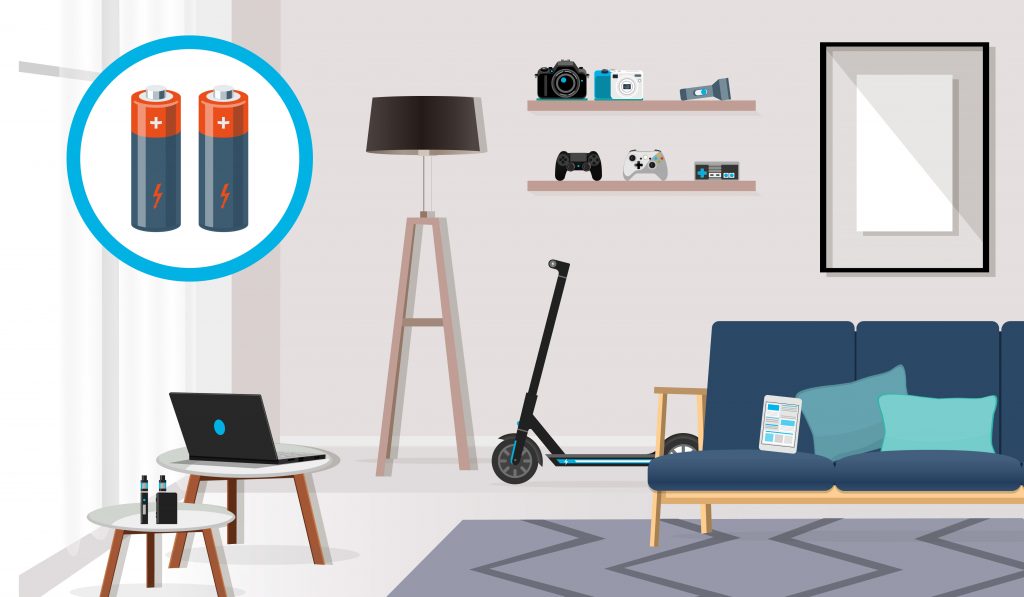The Dangers of Lithium-ion Battery Fires
Lithium-ion batteries are found in more and more of the electronic devices we buy and use these days. There are two good reasons for this: firstly, they are easily rechargeable so that they can have a long useful life, and secondly they pack a lot of punch for their weight. A typical lithium-ion battery can store 150 watt-hours per kilogramme of battery, compared to 100 for a niMH battery and just 25 for a lead acid battery.
That makes them perfect for the devices we put them in, of which there are many.

What consumer products use lithium-ion batteries?
Lithium-ion batteries can be found almost everywhere you turn in our modern lives, from mobile phones, tablets, laptops and bluetooth headphones to vaping devices, power tools, electric toothbrushes and e-scooters.
In fact, almost any electronic device you have at home that you can recharge is likely to have a lithium-ion battery inside.
What happens when a lithium-ion battery catches fire?
Fires can start in lithium-ion batteries for a number of reasons, including storing them (or the devices they are in) at high temperatures, damage to the battery or the device, the use of poor-quality components by the manufacturer, and overcharging. The batteries are made up of lots of individual cells – if one cell is damaged or overheats, it can heat up rapidly and burst, releasing flammable gases and eventually catching fire.
Why are they dangerous?
Once alight, they can get very hot, very quickly, with the fire rapidly spreading from one cell to the next in what is known as a thermal runway. The speed and intensity of this reaction has the potential to cause the battery to explode and turn a relatively minor fire into a major one in a matter of seconds.
How common are battery fires?
Thankfully, lithium-ion battery fires are not common, but it is worth being aware of their potential with these batteries being so prevalent in our homes. With Christmas just around the corner, there are likely to soon be even more, so knowing how to store and look after lithium-powered devices could be crucial.
There are a number of things you can do to minimise the risk of a lithium-ion battery fire, which we explored in depth in this previous article.
One thing to be particularly aware of at this time of year – especially in the midst of this cost of living crisis – is the danger of buying cheaper versions of electronic goods from unregulated sources. There’s usually a very good reason why an electronic device might be much cheaper than those from a reputable supplier; that might be a legitimate reason – such as overstocking or an older model being superseded by a newer version – but it could also be because it hasn’t gone through essential safety testing or contains cheaper, less reliable parts. You should be especially careful if it’s not a brand name you recognise or for which you can’t find positive reviews online.
How do you put these fires out?
It used to be that the only way to deal with a fire of this kind was to let it burn itself out, but the success of that approach somewhat depended on the fire not being near other flammable items or other electronic devices that could also react to the intense heat being produced.
Now, however, there are specialised lithium-ion battery extinguishers that use a compound called Aqueous Vermiculite Dispersion (AVD), which is a mineral-based agent specifically designed to extinguish lithium-ion battery fires.
They come in a wide range of sizes suitable for most applications, from small 500ml containers suitable for dealing with single consumer items, up to 50-litre extinguishers that should be kept in places where multiple devices are being stored and/or used.
Here at Scutum London, we’re specialists in all aspects of fire safety and can supply the right extinguishers for the particular fire risks at your business premises. If you want more advice or information about lithium-ion batteries and their associated fire risks, or you want to book a fire risk assessment by one of our experienced team, please get in touch with us now.
Request a Callback
Just fill in your details below and we'll get back to you as soon as we can!

About Scutum London
Scutum London is a leading expert in fire safety and security solutions for businesses and organisations located across South East England, including London and Surrey.
From fire alarms, fire extinguishers and fire risk assessments to access control, CCTV and intruder alarm systems – and a lot more besides – we offer a comprehensive range of products and services designed to keep you, your business and your staff and visitors safe.
With decades of industry experience to call on, we’re proud to hold accreditations from leading trade associations and bodies such as British Approvals for Fire Equipment (BAFE), the British Fire Consortium, the Fire Industry Association (FIA) and Security Systems and Alarms Inspection Board (SSAIB).
If you’d like to find out more about Scutum London, get in touch with our friendly team or explore our products and services on our site.

